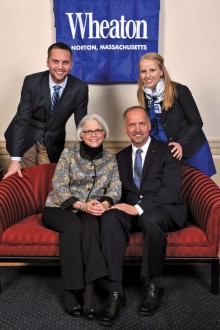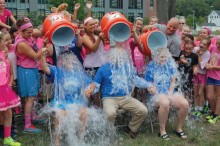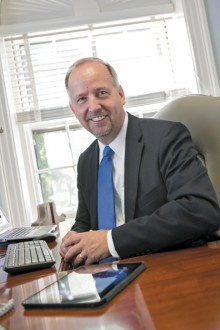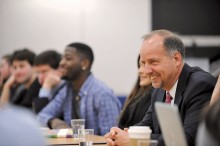Driven by values
Dennis Hanno begins his journey with Wheaton

The major turning point in Dennis Hanno’s professional life coincided with the arrival of his first child, Ted.
He was presiding over a fast-growing accounting practice in a small community in upstate New York but questioning whether the professional path that he had imagined for himself was what he really wanted to be doing. It was a subject that he and his wife, Susan, had been discussing for some time.
“My analysis with Susan was that I really love working with people,” he said, recounting the conclusions that emerged from taking stock of what he liked about accounting and what was important to him for the future. “I love doing new things, and I love helping people to understand issues and ideas. Most of all, I knew that I wanted to help people improve their lives. And that led me to the idea of returning to college to earn a Ph.D.”
Within six months, Hanno had embarked on the journey to earn a Ph.D. and begin a career in academia that would take him from the suburbs of Boston to major cities in Europe and Asia to villages in Africa.
Diving in
Fast-forward 33 years. It’s barely one week into Hanno’s term as president of Wheaton College and a small crowd stands on the lawn between the Mars Center for Science and Technology and the Haas Athletic Center. The group—Head Women’s Basketball Coach Melissa Hodgdon, students serving as counselors for her summer camp, 50 elementary and middle school girls and a small crowd of staff members—waits for President Hanno, who has been delayed by a meeting that has run past its allotted time.

“All right! Hello, everyone. … We’re here today to accept our ‘Chilling for Charity’ challenge,” Hodgdon says for the benefit of the video camera recording the moment. The purpose of the event is to raise money to fight cancer; the event itself requires an ice cold bucket of water to be dumped over the heads of participants, literally.
When he is introduced, Hanno calls out some of his former colleagues at Babson College to also take on the challenge and then says, “Let’s do it, guys. I don’t think you can handle it as well as we can. We’re going to be like Mount Rushmore here. We’re not even going to move when this water hits us.”
The new president proves as good as his word. Apart from a few deep breaths and some shouts of exhilaration (that it’s over?), neither he nor Coach Hodgdon nor Fitzgerald move as the cascade of ice water pours over their heads to the delighted roar of the crowd of onlookers.
But following a quick celebration, Hanno moves to the edge of the crowd. His wife, Susan, hands him a towel to dry off, and then he rushes back to the Presidents’ House for a change of clothing before a meeting to delve into the college’s budget.
The fun event is pure Hanno. Throughout his career in higher education, he has built a well-deserved reputation for being spontaneous, extremely approachable and engaged in every aspect of student life—from the classroom and conference room to athletic fields and every other spot on campus.
At Babson, where he served most recently as its provost and academic vice president, Hanno made it a point to announce late-night pizza parties on social media, just hours before arriving in a campus lounge with a delivery of 100 pies, for example. On one occasion, he not only arranged the opening of a group meeting room at 3 a.m. so that students from India and Pakistan could watch their national teams play each other, but he joined them as well.
The depth and breadth of his connections to the Babson community prompted an informal group of students and graduates at the business school to start a very visible social media campaign to have Hanno named as the institution’s next president. After the college’s board of trustees chose to appoint former Massachusetts Lieutenant Governor Kerry Healey to the post, Hanno was promoted to the post of provost, responsible for overseeing all of the college’s graduate and undergraduate programs.

“I just think that it’s so important to make a connection with people,” he said. “I’ve always been a big user of social media and I try to be an early adopter in any way I can. I’m on Twitter, I’m on Facebook, I’m on Instagram, which is the new hot place for me. I very consciously use it as a tool to communicate things about myself and about things going on at the institution,” he said.
“Social media gives us a whole new vehicle to connect with a much broader audience, particularly when you think about alumnae and alumni who are so connected to Wheaton. This gives me the opportunity to share things with them in an instant.”
Starting out
Dennis Hanno learned about the virtues of hard work and the power of education early. He grew up in a family of six on a dairy farm in Glenfield, N.Y., about 50 miles east of Lake Ontario. The farm, with 100 cows, was a full-time occupation for the family. His father handled the bulk of the work, but there was plenty for each of his children, and Hanno recalls learning to drive the tractor early on so that he could spread manure on the fields. (He also remembers first meeting his wife, Susan, when they were children, though only as acquaintances. Her father was the veterinarian who cared for the family’s livestock.)
“I always had chores to do every day,” he said. “There was never a vacation. I mean, you couldn’t. You can’t say to the cows, ‘Hey, we will be back in two weeks,’” he said. “So I never remember taking an extended vacation of any kind, other than a day to go to the state fair, or something like that.”
Working on the farm taught Hanno an early lesson on the importance of “getting the job done, no matter what it takes” and the power of working as part of a team.
“On the farm, everybody had a role to play. And you learn that no matter how trivial your chore might seem—feeding the cows or taking the manure out or whatever it was—it absolutely had to be done,” he said. “So it was your responsibility to keep things moving; everyone else was going to rely on you to do your job.”
Education received top billing at the Hanno household. “Starting from early on, my mother made us all realize that education was the key to opportunity, that education was the way we could all have an impact,” said Hanno, who excelled in school and also competed in sports as a three-season athlete—football, basketball and track. “Education was the way that we could open up so many different doors for each other.”
With encouragement from his mother, herself a teacher, Hanno applied for admission to several colleges, including Michigan State and Notre Dame. “And when I got into Notre Dame, it was like a dream come true,” he said. “The guidance counselor came, pulled me out of class, and said, ‘You know, we just heard that you got into Notre Dame,’” and it seemed like there was some urgency around making a decision right away.”
Hanno recalls hesitating over his choice, knowing that selecting the University of Notre Dame would place a heavy financial burden on his family. “I remember the guidance counselor; my mother, who was substitute teaching that day; and I standing in the hallway, talking about this, and my mother said, ‘If you want to go to Notre Dame, we’ll do whatever it takes to get you there.’”
He pauses for a moment, appreciating anew the enormity of that moment and his mother’s determination. “My mother would have had to make the extra income, which she did by substitute teaching at about $30 a day, if I remember,” he said. “And when I got to Notre Dame, I worked. I worked a ton of hours at the cafeteria, and ended up taking a job as a bartender later on.”
Education continues to be a central point of emphasis for the Hanno family. His wife, Susan, is an elementary school teacher. Indeed, they met again as college graduates, just before Susan took her first teaching job in Boston, and Dennis was poised to begin a one-year master’s program in accounting. For much of their married life, both have worked in education and lived as part of a college community. Today, their daughter, Emily, also works in education, as a Teach For America staff member.
Making an impact
The idea that education creates opportunity represents a central operating principle for Hanno, who identified it as one of his core values when he was introduced to the Wheaton community in Cole Memorial Chapel in February.
“Higher education gave me opportunities I never dreamed imaginable,” he said. “Certainly, I never dreamed that I would have the opportunity to be at the head of this great institution. What has always been important to me is to think about how we … can help to create that opportunity for the people we work with, and even spread that opportunity beyond.”
The promise of being able to help others to share in the opportunities of education spurred Hanno to pursue and earn his Ph.D. in accounting from the University of Massachusetts Amherst and then to take a position teaching accounting, first at Boston College, where he taught for two years, and then at UMass. Within six years, he had been invited to join the administration of the university’s Isenberg School of Management as its dean for undergraduate matters, and he dove into the role with remarkable energy.
Thomas O’Brien, the former dean of the Isenberg School, said, “The whole community at the University of Massachusetts Amherst knew who Dennis was. He developed a number of programs and activities for undergraduates that enriched their education.”
The former accountant who had chosen to major in business rather than history—his first undergraduate interest—championed the arts and humanities, sciences and social sciences for the students enrolled at the university’s business school.
“Higher education offers the opportunity for students to explore the challenges of the world from many, many different perspectives,” he said. “The context that that breadth of study provides is critically important in today’s world, and it’s why the liberal arts are so important, no matter what you plan to do.”
In 2006, when he was recruited to serve as the undergraduate dean at Babson College in Wellesley, Mass., he brought that conviction with him, and worked with faculty to revise the school’s curriculum. The result was an emphasis on the study of liberal arts disciplines for all students at the institution and integrated entrepreneurial leadership across the campus.
A former colleague, Elizabeth Swanson Goldberg, a professor of English and the chair of the arts and humanities division at Babson, praised his impact at the college. “Dennis consistently put himself on the line to ensure that Babson lives up to its commitment to deliver fully half of its credits in the liberal arts,” Professor Goldberg said. “He also envisioned and implemented a range of rich, innovative programs that brought liberal arts and entrepreneurship together, almost always with the kind of global focus that marks the most relevant educational initiatives today.”
Global service

Hanno may be best known for a collection of programs that take place at neither UMass or Babson but has involved both communities: business development and entrepreneurship workshops for high school students that he runs in several African countries.
The effort began thanks to a chance conversation that Hanno had with UMass nursing professor Leda McKenry, who had been taking nursing students to Ghana to conduct vaccinations and health screenings. The people where she was working were also interested in receiving assistance in business development and technology. Intrigued, Hanno jumped at the opportunity.
“I thought that I would just go once or twice and then move on,” he recalled. “But, the first time I went, I connected with the people that I met with in Sekondi and Takoradi, Ghana.”
Since then, he has been back many times, building an entrepreneurship and leadership program in which Hanno and students, faculty and staff from UMass, and later Babson, would lead high school students in designing and launching business ideas and community-based projects. The project has expanded over the years to Rwanda, Tanzania and Kenya.
“Dr. Hanno has had a tremendous impact in our region,” said the Rev. Robert Andoh, who leads the Assemblies of God Church in Sekondi, Ghana. “He is a friend to our community, which has been deprived of many things. I personally feel that Dr. Hanno is a man who, anywhere he finds himself, the people around him will be glad that he is there.”
For his part, Hanno prefers to talk about the effect that the work has had on his students and himself. When he spoke in Cole Chapel, he alluded to his work in Africa while extolling the value of service.
“As I have journeyed through life, I have figured out that we all have a lot of gifts,” Hanno said. “But those gifts only have value if we share them with others. … And what I have found is that the more you share, the more you grow, and that’s both as an individual and as a community.”
Hanno expanded on that point in a conversation during the summer. “For me, there is great satisfaction in working with people and seeing that I could have an impact on their lives. And what really keeps me going back is the fact that I am having an impact not only in these communities in Africa but also on the people that I take with me.”
Indeed, it’s work that he intends to continue, even as he serves as president of Wheaton. Hanno has told numerous groups that he plans to lead new trips and new programs to Africa, this time with Wheaton students as his partners.
Looking ahead
The first order of business for Hanno, however, is settling into the role of president and organizing the college community to continue its response to a public that is deeply skeptical about the value of liberal arts study.
“Liberal arts colleges face a number of pressures, but I believe that two distinct but linked criticisms present the most pressing issues,” Hanno said. “First, there is a growing belief among some that higher education should focus primarily on job training and the long-term financial security for students.
“The second criticism relates to the financial model. Many believe that no matter what the outcomes for students, the liberal arts education model is too expensive to be able to sustain. Wheaton, along with many other colleges, needs to proactively address these criticisms.”
Given Hanno’s past work championing the liberal arts, and his appointment as Wheaton’s president, it’s no surprise to hear him reject those ideas. “I believe that a liberal arts education is exactly the kind of education that students need: it provides them with the intellectual and practical skills needed to navigate a complex world, not just in a first job but throughout their lives,” he said, before adding, “We need to be mindful of the sacrifices that families make when they invest in a Wheaton education, and continue to provide the high value and impact that makes this investment worthwhile.”
The new president has been consistent in saying that he did not arrive on campus with a ready-made plan for the college’s future. In fact, he has said that the college has many promising initiatives under way and that his role will be to help the community—students, alumnae/i, parents, faculty and staff—articulate a shared vision for the future. Hanno began that process of consultation well before he took office in July, and he expects to continue the work for some months to come.
But he is quick to add one thing that he believes deeply already:
“What Wheaton does now to prepare its students is exactly what is needed to solve the many challenges facing the world today. Innovative and creative solutions can only result from having multiple perspectives and views on an issue.”
